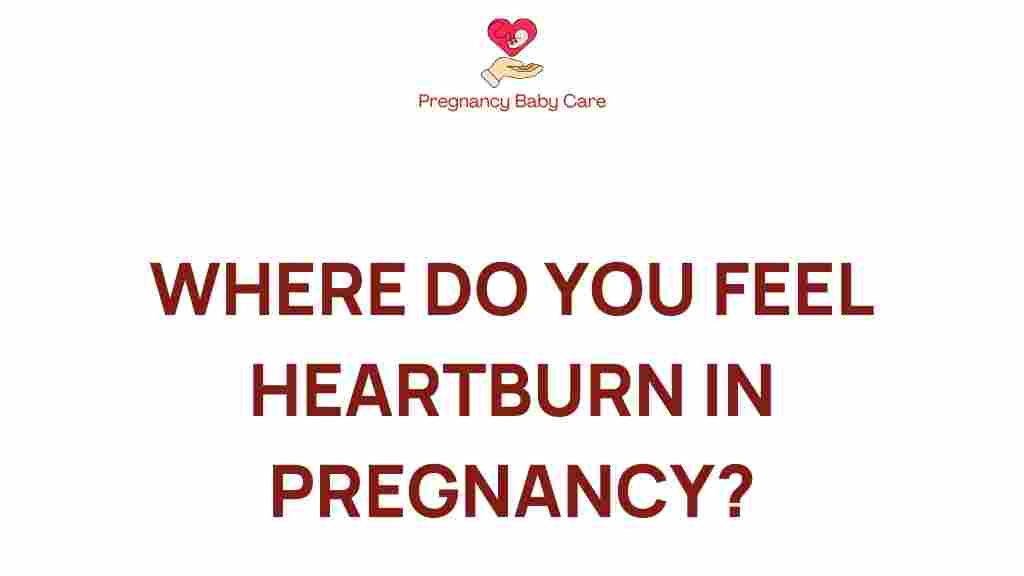Unraveling the Mystery: Where Do You Feel Heartburn in Pregnancy?
Heartburn during pregnancy is a common discomfort that many expectant mothers experience. As your body goes through various changes, understanding the symptoms and causes of heartburn can help you manage this condition effectively. In this article, we will explore where you may feel heartburn during pregnancy, the potential triggers, remedies, and useful advice to ease your discomfort throughout the different trimesters.
Understanding Heartburn in Pregnancy
Heartburn is a burning sensation that typically occurs in the chest or throat, caused by acid reflux. During pregnancy, hormonal changes and physical pressure from the growing uterus can lead to increased heartburn symptoms. It is essential for expectant mothers to recognize this discomfort and its causes to maintain digestive health.
Where Do You Feel Heartburn in Pregnancy?
Expectant mothers often describe heartburn as a burning sensation that can range from mild to severe. Here are the primary areas where you may feel heartburn during pregnancy:
- Chest: Many women report feeling discomfort in the chest area, often described as a burning sensation behind the breastbone.
- Throat: Some may experience a sour or bitter taste in their mouth, indicating that stomach acid has reached the throat.
- Upper Abdomen: A feeling of fullness or pressure may also be present in the upper abdomen.
Common Symptoms of Heartburn in Pregnancy
Recognizing the symptoms of heartburn can help you differentiate it from other gastrointestinal issues. Common symptoms include:
- A burning sensation in the chest (heartburn)
- Regurgitation of food or sour liquid
- Difficulty swallowing
- Feeling of fullness or discomfort after meals
- Chronic cough or hoarseness
What Causes Heartburn During Pregnancy?
Several factors contribute to heartburn during pregnancy:
- Hormonal Changes: The increased levels of progesterone can relax the valve between the stomach and esophagus, allowing stomach acid to flow back up.
- Growing Uterus: As your baby grows, the uterus puts pressure on the stomach, pushing acid into the esophagus.
- Dietary Choices: Certain foods and beverages can trigger heartburn. Spicy foods, caffeine, and acidic foods are common culprits.
Heartburn by Trimester
Heartburn can occur at any stage of pregnancy, but its intensity may vary by trimester:
First Trimester
During the first trimester, hormonal changes may begin to affect your digestive system. Heartburn may be mild but can still be bothersome.
Second Trimester
As the uterus expands, expectant mothers often report an increase in heartburn symptoms during this period. The baby’s growth adds more pressure on the stomach.
Third Trimester
In the final trimester, heartburn may reach its peak due to the significant pressure on the stomach and digestive tract. Many women feel that their heartburn worsens as they near their due date.
Effective Remedies for Heartburn in Pregnancy
Fortunately, there are several remedies and lifestyle changes that can help alleviate heartburn symptoms:
- Eat Smaller Meals: Instead of three large meals, opt for smaller, more frequent meals to prevent excessive stomach pressure.
- Avoid Trigger Foods: Identify and avoid foods that trigger your heartburn symptoms, such as spicy foods, chocolate, and citrus.
- Stay Upright After Eating: Remain in an upright position for at least an hour after meals to help digestion.
- Elevate Your Head While Sleeping: Use pillows to raise your head while sleeping to prevent acid reflux during the night.
- Hydration: Drink plenty of water throughout the day, but avoid drinking large amounts with meals.
Over-the-Counter Remedies
Before taking any medication, consult with your healthcare provider. Some over-the-counter remedies that may be safe during pregnancy include:
- Antacids: These can help neutralize stomach acid and provide quick relief.
- H2 Blockers: Medications like famotidine can reduce stomach acid production.
- Proton Pump Inhibitors: These are often prescribed for severe cases of heartburn.
For more information on safe medications during pregnancy, check out this resource.
When to Seek Medical Advice
While heartburn is common during pregnancy, there are instances when you should consult your healthcare provider:
- If heartburn is severe and persistent despite lifestyle changes
- If you experience additional symptoms such as severe abdominal pain or vomiting
- If heartburn interferes significantly with your daily activities or sleep
Tips for Managing Heartburn
Here are some additional tips for managing heartburn during your pregnancy:
- Keep a Food Diary: Track what you eat and identify patterns that trigger your heartburn.
- Practice Relaxation Techniques: Stress can exacerbate heartburn, so consider yoga or deep-breathing exercises.
- Wear Loose Clothing: Tight clothing can increase abdominal pressure and worsen heartburn.
Conclusion
Heartburn is a common yet uncomfortable symptom experienced by many expectant mothers during pregnancy. Understanding where you feel heartburn, recognizing its symptoms, and identifying effective remedies can significantly improve your digestive health and overall comfort. From the first trimester to the third, being proactive about managing heartburn can make your pregnancy experience more enjoyable.
Always consult with your healthcare provider for personalized advice and treatment options to ensure both your and your baby’s health. For more tips on maintaining a healthy pregnancy, visit our website.
This article is in the category Pregnancy and created by PregnancyBabyCare Team
